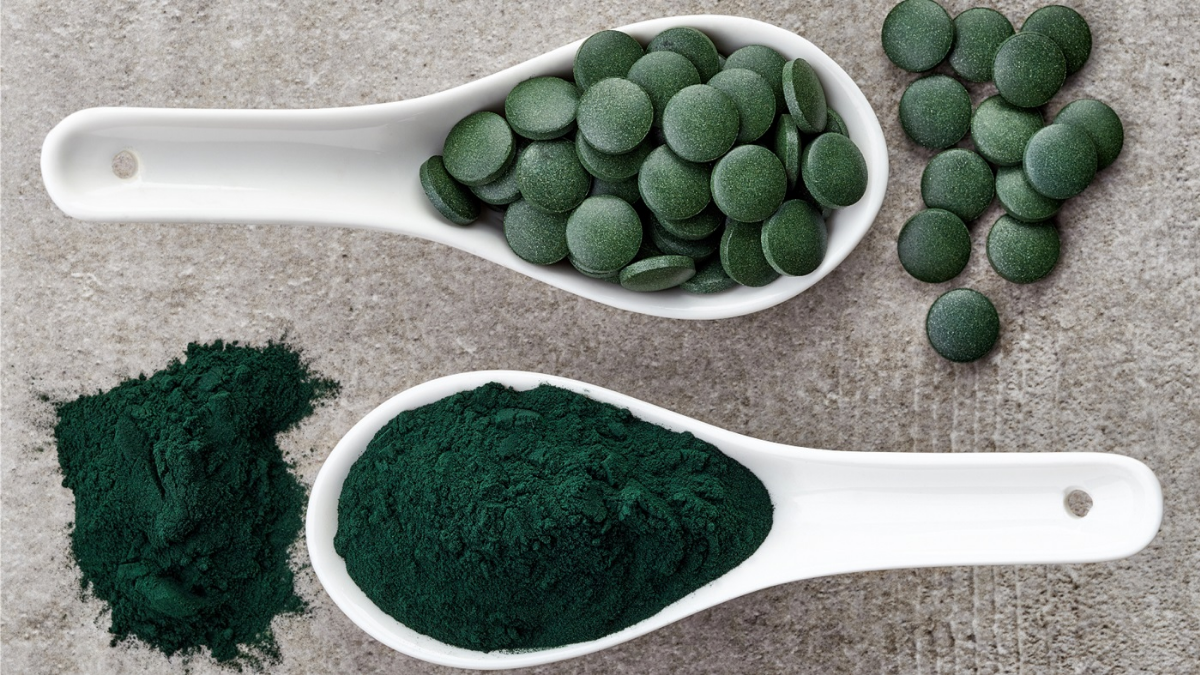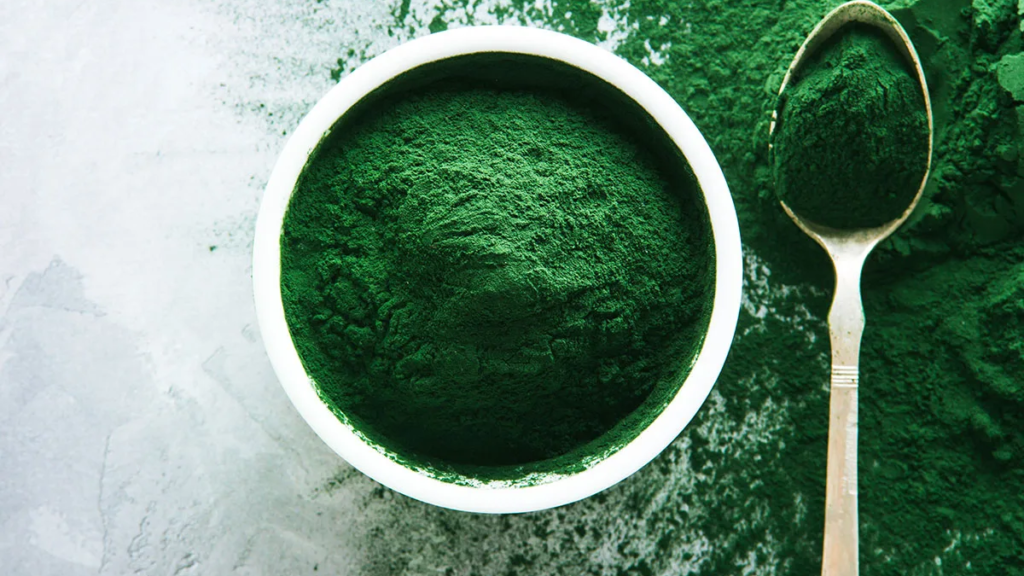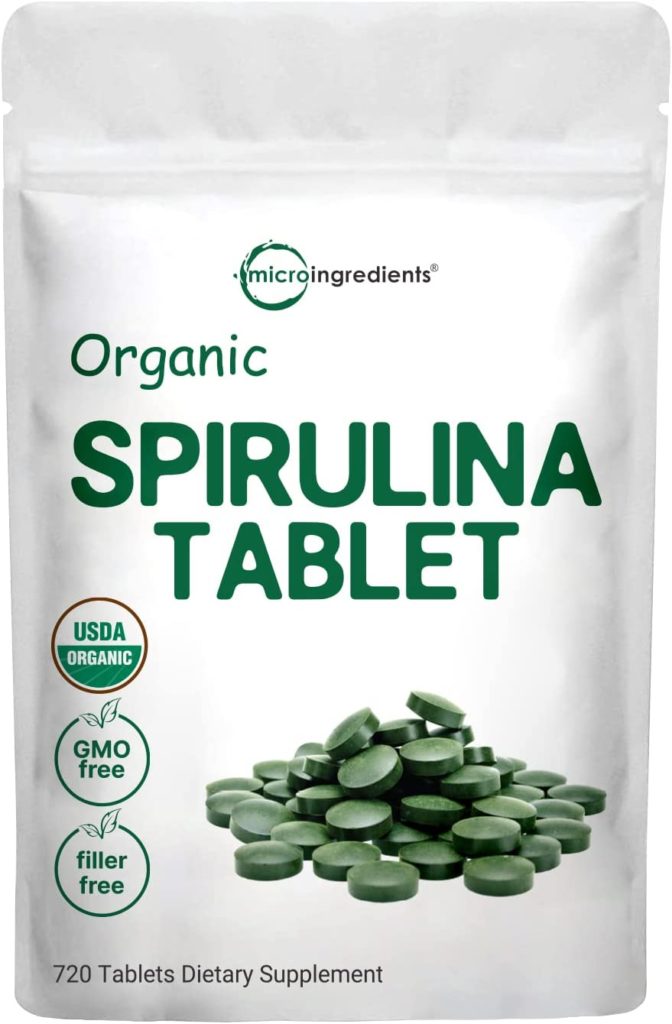Spirulina is a blue-green alga that is thought to be one of the Earth’s oldest life forms. Spirulina was first utilized as an endurance enhancer by the Aztecs. It is now regarded as a superfood, an all-in-one source of nutrients with protein levels comparable to eggs. The Aztecs also employed Spirulina to heal various ailments, and legend has it that the kingdom’s couriers used the algae to keep going during marathon runs. Many of the reported benefits of Spirulina are supported by modern studies, and researchers continue to investigate its potential for addressing health problems.
Because Spirulina has a bitter taste, it’s typically included with yogurts, juices, and smoothies to mask it. Supplements containing Spirulina are widely accessible in health food stores.Spirulina is a nutrient-dense alga. It contains Phycocyanin, a healthy plant-based protein. According to research, this has antioxidant, pain-relieving, anti-inflammatory, and brain-protective qualities. Spirulina’s antioxidants and other nutrients have been linked to a variety of health advantages, including:
Spirulina Nutrition Facts
Spirulina’s Health Benefits
Magnesium is also found in Spirulina. This mineral aids in the proper functioning of your body, such as muscular use and heartbeat. It’s also generating protein and energy, but most people don’t get enough of it in their diet.
1. Anti-Cancer Effects
Spirulina contains several antioxidants that have anti-inflammatory properties in the body. Cancer and other diseases are exacerbated by chronic inflammation. Phycocyanin, the blue-green plant pigment that gives Spirulina its color, has been shown to reduce inflammation in the body and prevent tumor growth and kill cancer cells. The immune-boosting protein is being researched to see if it could be used to treat cancer.
2. Cardiovascular Health
According to studies, the protein in Spirulina can limit cholesterol absorption in the body, decreasing cholesterol levels. This keeps your arteries free, minimizing the strain on your heart that can contribute to heart disease and blood clots that cause strokes. Its protein lowers triglyceride levels, and these lipids in your blood can cause artery hardening, putting you at risk for heart disease, diabetes, and pancreatitis.
3. Pancreatitis
Spirulina also helps your blood arteries relax by increasing nitric oxide generation in your body. This has been shown in studies to lower blood pressure and minimize the risk of heart disease.
4. Relief from Allergies
Pollen, animal hair, and dust allergies may benefit from the anti-inflammatory effects of Spirulina’s antioxidants. Participants in one study reported significant reductions in symptoms such as congestion, sneezing, and itching, suggesting that Spirulina could be a useful alternative to allergy medicines.
5. Support for the Immune System
Vitamins E, C, and B6 are among the vitamins and minerals included in Spirulina, which are important for supporting a healthy immune system. According to research, Spirulina also increases the development of white blood cells and antibodies, which fight viruses and germs in the body. Spirulina has been shown to fight herpes, the flu, and HIV in the lab, but additional research is needed to test these benefits in humans.
6. It’s possible to keep your Eyes and Mouth Healthy.
Spirulina is high in zeaxanthin, a plant pigment that may help prevent cataracts and eyesight loss as people age. Its antimicrobial qualities may also aid in the maintenance of healthy dental hygiene. Spirulina-enhanced mouthwash was reported to lower tooth plaque and the risk of gingivitis in participants in one study. Another study found that it reduced the risk of mouth cancer in cigarette chewers.
7. Antioxidant and Anti-Inflammatory Properties are Strong.
Your DNA and cells can be harmed by oxidative damage. Chronic inflammation, which contributes to cancer and other disorders, might be triggered by this damage. Spirulina is high in antioxidants, which protect the body from oxidative damage, and Phycocyanin is the principal active ingredient. Spirulina’s unusual blue-green color is due to this antioxidant component. Phycocyanin has powerful antioxidant and anti-inflammatory properties, fighting free radicals and inhibiting the synthesis of inflammatory signaling molecules.
8. Can Lower Bad LDL and Triglyceride Levels
Heart disease is the biggest cause of death worldwide, and a higher risk of heart disease has been related to several risk factors. Spirulina, it turns out, has a good impact on several of these characteristics. It can lower total cholesterol, “bad” LDL cholesterol, and triglycerides, for example, while increasing “good” HDL cholesterol. 2 grams of Spirulina per day significantly improved these indicators in a trial of 25 persons with type 2 diabetes. Another study found that 1 gram of Spirulina per day reduced triglycerides by 16.3% and “bad” LDL by 10.1 percent in persons with high cholesterol. Several other researchers have demonstrated that larger dosages of 4.5–8 grams per day have beneficial effects.
9. May Have Anti-Cancer Properties
Spirulina may have anti-cancer properties, according to some data. It has been shown in animal studies to reduce cancer occurrence and tumor size. The effects of Spirulina on oral cancer — or cancer of the mouth — have been extensively researched. One study looked at 87 Indians who had precancerous lesions in their mouths called oral submucous fibrosis (OSMF). Forty-five percent of those who took 1 gram of Spirulina each day for a year saw their lesions vanish, compared to only 7% of those in the control group. Almost half of the participants who stopped taking Spirulina got lesions again the following year. Another research of 40 people with OSMF lesions found that 1 gram of Spirulina per day improved OSMF symptoms more than the medication Pentoxyfilline.
10. May Reduce Blood Pressure
Many dangerous disorders, including heart attacks, strokes, and chronic renal disease, are caused by high blood pressure. While one gram of Spirulina is ineffective, a daily intake of 4.5 grams has lower blood pressure in people with normal blood pressure. An increase in nitric oxide production, a signaling molecule that helps your blood arteries relax and expand, is likely to cause this decrease.
11. Muscle strength and endurance may be improved.
Muscle tiredness is caused by oxidative damage caused by exercise. Antioxidant qualities in certain plant meals can aid athletes, and physically active people reduce this damage. Spirulina looks useful, as studies have shown that it increases muscle strength and endurance. Spirulina increased endurance in two experiments, dramatically reducing the time for subjects to become exhausted.
12. May Aid Blood Sugar Control
Spirulina has been linked to drastically decreased blood sugar levels in animals. It has outperformed popular diabetes medicines in some circumstances, such as Metformin. There is some evidence that Spirulina can be beneficial in humans. 2 grams of Spirulina per day resulted in a significant drop in blood sugar levels in a two-month study of 25 persons with type 2 diabetes. HbA1c, a marker for long-term blood sugar levels, decreased from 9% to 8%, which is significant. According to studies, a 1% drop in this marker can reduce the risk of diabetes-related death by 21%. However, this was a modest and short-term study. More research is required.
Is it Safe to Consume Spirulina Daily?
It’s healthy to consume up to 8 grams of Spirulina each day, and many individuals do so because it comes in powder form. Spirulina is a type of blue-green algae. According to the National Institutes of Health (NIH), people have used doses of up to 19 g per day for a maximum of 2 months and up to 10 g per day for six months. Nausea, sleeplessness, and headaches are some of the minor adverse effects of Spirulina. Nonetheless, this supplement is usually regarded as safe, with most users reporting no negative side effects.
Spirulina may contain toxic substances, thin your blood, and aggravate autoimmune diseases. Consumption of Spirulina from such untrustworthy sources for an extended period can harm important organs like the kidneys and liver. Children have a larger chance of acquiring deadly consequences from heavy metal poisoning from contaminated Spirulina than adults.
Is Spirulina Safe for Kidneys?
However, these experts went on to say that eating more than 50 grams of Spirulina each day is not recommended. The rationale is that the plant has a high concentration of nucleic acids and DNA-related compounds, and uric acid is produced when broken down, leading to gout or kidney stones. Spirulina may be dangerous to you if you are prone to gout attacks or kidney stones. Beth Israel Deaconess Medical Center recommends limiting spirulina consumption to 50 grams per day to minimize high uric acid levels.
Researchers concluded that spirulina and vitamin C might minimize the risk of liver damage or renal failure in cancer patients who had received Cisplatin. They recommended taking a spirulina and vitamin C supplementation plan before and throughout chemotherapy rounds. If you take blood thinners or have an autoimmune problem, bleeding disorder, allergies, or PKU, you should avoid Spirulina. Consult your doctor if you’re not sure if this supplement is good for you.
What is the Best Time to Take Spirulina?
It is preferable to take Spirulina at least four hours before bedtime, but it does not appear to make a difference whether one takes six tabs at once or two tablets three times a day; most people report feeling better whenever and however take Spirulina, and it rarely causes issues. You can take Spirulina with, before, or between meals; before or after a workout; or whenever you’re feeling short on energy.
Because high-protein diets have been shown to boost alertness, and Spirulina is one of the most protein-dense whole foods, it generally doesn’t matter how or when you take Spirulina; it’ll still be beneficial. Some experts, however, advise taking it at least four hours before bedtime. So, for maximum nutritional bioavailability, take on an empty stomach and wait 15 minutes to give the body to get a head start on absorbing these vital liquid nutrients before dealing with any fiber (solid food) that delays absorption.
Is Spirulina Beneficial to the Liver?
Spirulina may assist in preventing patients with chronic liver disease from liver damage, cirrhosis, and liver failure. In NAFLD patients, supplementing with Spirulina (Arthrospira platensis) at a high dose of 6 g daily has many favorable metabolic effects and enhances their health-related quality of life. Supplementing with Spirulina could be a safe and helpful dietary supplement for NAFLD patients. Spirulina has been linked to clinically obvious liver impairment in isolated case reports. However, the impact of Spirulina versus other herbal components or toxins has yet to be determined.
If liver toxicity from Spirulina occurs, it must be quite rare.FUL’s sparkling spirulina beverages are excellent for getting rid of a hangover. They and they’re the critical nutrients and antioxidants that Spirulina provides. Because of Spirulina’s anti-inflammatory properties, they can also assist your liver in processing all of the alcohol without causing undue stress.
Is Spirulina Good for Skin?
Spirulina can improve your skin’s overall health and appearance and reduce acne buildup and edema. Spirulina, high in nutrients, vitamins, and both fatty and amino acids, reduce inflammation, tones the skin, and promotes cell turnover for a more youthful appearance. Spirulina is a complete protein that includes essential amino acids and omega-3 fatty acids, and minerals such as B vitamins and iron. Spirulina is an excellent addition to your skincare routine because of these properties.
Spirulina, which is high in antioxidants, can improve the radiance and complexion of your skin. The ultimate detoxifier for your skin is a spirulina face mask. Spirulina is currently used in topical skin care formulations as a hydrating, anti-wrinkle, anti-aging, and anti-acne ingredient. Additionally, cosmetic formulators use this microalga to enhance good UV protection, cure skin pigmentation issues, and heal wounds.
Conclusion
Spirulina is a bacterial species that can thrive in fresh and saline water. It’s a member of the cyanobacteria family, which includes single-celled organisms like blue-green algae. Photosynthesis is a process by which cyanobacteria, like plants, may extract energy from sunlight. The Aztecs first consumed Spirulina, but it gained popularity after NASA claimed it could be grown in space and consumed by astronauts. Spirulina is typically consumed in doses of 1–3 grams per day; however, higher doses of up to 10 grams per day are beneficial.
This teeny-tiny alga is packed with nutrients. A single tblsp. Dry (100 g) The same amount of food contains only 290 calories and 24 grams of digestible carbs. Gram per gram, Spirulina may be the most nutrient-dense food on Earth. A tablespoon (100 grams) of Spirulina contains around 8 grams of fat, with nearly equal amounts of omega-6 and omega-3 fatty acids. Spirulina’s protein quality is comparable to that of eggs, and it provides your body with all of the critical amino acids it needs. Vitamin B12 is frequently present in Spirulina, although this is not the case. It contains a form of vitamin B12 called pseudo vitamin B12, which hasn’t been confirmed to work in people.




